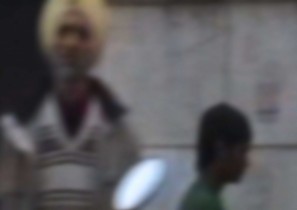Ernst Thoma
COLORS OF DELHI
May 21, 2016 – July 2, 2016
The filming was done in an urban environment–mainly in Old Delhi. The original films contain therefore an extraordinary dense soundtrack put up by fragments of words, shouts, honks and diverse sounds of various means of transport. The audio part of the installation was completely redone with new material, including pieces of the original sound. This results in the preservation of its density, but also leads away from being clearly identified.
The large installation in the hay barn comprises several projection frames and monitors. Three of the big frames and six monitors are hanging from the ceiling. The frames are transparent and can be viewed from both sides. The mix of frames and monitors is a considerable part of the spatial dramaturgy since their different light and colour intensity effects an additional scaling of depth. One of the most striking things is the slow motion and the overlapping of images. Best seen when a motorbike runs from one side across the picture and simultaneously but not identically crosses several frames. It just looks like the driver is hitting the break and continues in slow motion. Real time speed is decreased and the frames expose simultaneity, creating a surrealistic picture.
The Indian concept of time fundamentally differs in this regard from the Western understanding of time being a linear function. Characterised by Hinduism and its related reincarnation the Indians relate to time in a bigger frame. Seconds, minutes and hours don’t count, but the flow of life does. Life is not finite but a cycle. This facilitates the concept of time tremendously. This concept of time is closely connected with the belief in Karma where every action and thought causes Karma and leads to further involvements in the earthly world. For Hindus and Buddhists it is eminently important not to cause additional Karma in order to eventually break through the cycle of eternal reincarnation. From that perspective, everyone receives multiple, even innumerable possibilities to retire from their cycle of reincarnations–or to go through it again.
Ernst Thoma lives and works in Stein am Rhein. He graduated from the F+F Schule für Kunst und Mediendesign, Zurich and from the Elektronisches Studio der Musik-Akademie Basel. His work has been included in many exhibitions, among others at the Kunstraum Kreuzlingen, Internationalen Lichttage Winterthur, Zeppelin Museum Friedrichshafen, Kunsthalle Winterthur, Lichtinsel Kassel, Kunstmuseum Singen and Kunstmuseum Kanton Thurgau. His art work „Klänge der Nacht“ was part oft he Expo 02 in the BlindeKuh in Murten.
The large installation in the hay barn comprises several projection frames and monitors. Three of the big frames and six monitors are hanging from the ceiling. The frames are transparent and can be viewed from both sides. The mix of frames and monitors is a considerable part of the spatial dramaturgy since their different light and colour intensity effects an additional scaling of depth. One of the most striking things is the slow motion and the overlapping of images. Best seen when a motorbike runs from one side across the picture and simultaneously but not identically crosses several frames. It just looks like the driver is hitting the break and continues in slow motion. Real time speed is decreased and the frames expose simultaneity, creating a surrealistic picture.
The Indian concept of time fundamentally differs in this regard from the Western understanding of time being a linear function. Characterised by Hinduism and its related reincarnation the Indians relate to time in a bigger frame. Seconds, minutes and hours don’t count, but the flow of life does. Life is not finite but a cycle. This facilitates the concept of time tremendously. This concept of time is closely connected with the belief in Karma where every action and thought causes Karma and leads to further involvements in the earthly world. For Hindus and Buddhists it is eminently important not to cause additional Karma in order to eventually break through the cycle of eternal reincarnation. From that perspective, everyone receives multiple, even innumerable possibilities to retire from their cycle of reincarnations–or to go through it again.
Ernst Thoma lives and works in Stein am Rhein. He graduated from the F+F Schule für Kunst und Mediendesign, Zurich and from the Elektronisches Studio der Musik-Akademie Basel. His work has been included in many exhibitions, among others at the Kunstraum Kreuzlingen, Internationalen Lichttage Winterthur, Zeppelin Museum Friedrichshafen, Kunsthalle Winterthur, Lichtinsel Kassel, Kunstmuseum Singen and Kunstmuseum Kanton Thurgau. His art work „Klänge der Nacht“ was part oft he Expo 02 in the BlindeKuh in Murten.
Exhibition
May 21 – July 2, 2016
Opening reception:
Saturday, May 21, 2016, 3–8 pm
3 pm
Opening reception
4 pm
Welcome address
Saussages by bucher Schmid
Traditional buns by bakery Bisegger
6 pm
Exhibition tour
Sunday, May 22, 2016, 11 am–4 pm
Long weekend:
Saturday, June 25, 2016, 11 am–9 pm
Sunday, June 26, 2016, 11 am–4 pm
Opening hours:
Wednesday, Thursday, Friday 2–6 pm
Saturday 11 am–4 pm
and by appointment
#3 KunstKüche:
Friday, July 1, 2016, 7 pm
Opening reception:
Saturday, May 21, 2016, 3–8 pm
3 pm
Opening reception
4 pm
Welcome address
Saussages by bucher Schmid
Traditional buns by bakery Bisegger
6 pm
Exhibition tour
Sunday, May 22, 2016, 11 am–4 pm
Long weekend:
Saturday, June 25, 2016, 11 am–9 pm
Sunday, June 26, 2016, 11 am–4 pm
Opening hours:
Wednesday, Thursday, Friday 2–6 pm
Saturday 11 am–4 pm
and by appointment
#3 KunstKüche:
Friday, July 1, 2016, 7 pm

